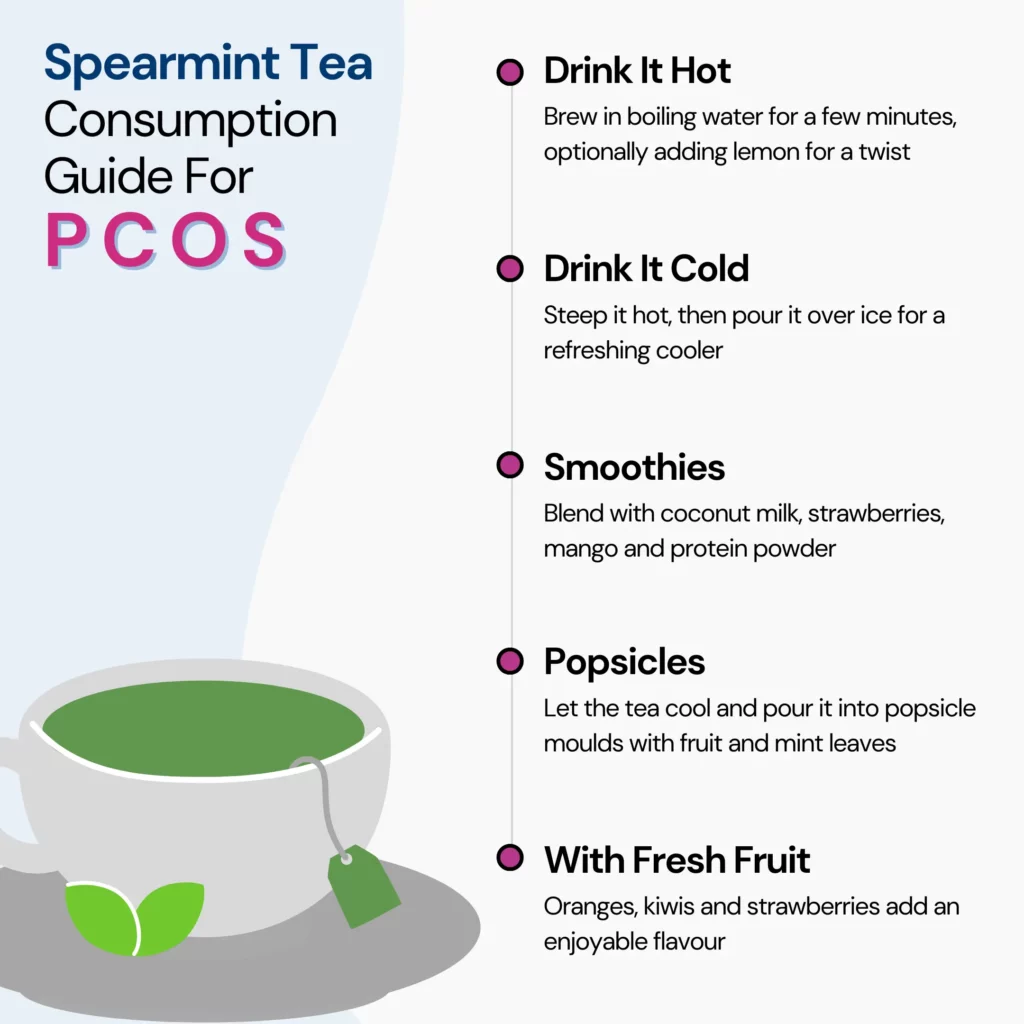One remedy for PCOS that is increasingly gaining attention is spearmint tea. Renowned for its refreshing flavor and health benefits, spearmint tea is being studied for its anti-androgenic properties, which could benefit women with PCOS. Could this common herbal tea be a game-changer in managing PCOS symptoms? This article delves into the scientific research, potential benefits, and practical considerations of incorporating spearmint tea into your daily routine.
PCOS: An Overview
PCOS (polycystic ovary syndrome) is a prevalent condition affecting women of reproductive age.
It usually starts in adolescence, with symptoms that can change over time.
Key characteristics Of PCOS
- Hormonal imbalances
- Irregular menstrual cycles caused by a lack of or delayed ovulation
- Higher-than-normal androgen levels
- Presence of ovarian cysts
- Infertility
Although PCOS is a chronic condition with no known cure, various treatments can help manage and alleviate its symptoms.
Lifestyle changes like regular exercise and a healthy diet can be helpful.
The exact cause of PCOS remains unknown, but a family history of PCOS or type 2 diabetes can increase a woman's risk, suggesting a potential genetic or metabolic link.
Is Spearmint Tea Effective For PCOS?
Spearmint tea demonstrates potential efficacy in managing PCOS symptoms, possibly due to its anti-androgenic properties.
These properties could help reduce elevated levels of androgens commonly associated with the condition.
What Does Research Say?
Research indicates that spearmint has promising effects on managing PCOS symptoms. Here's what various studies have shown:
Animal Studies
In a 2010 study, the effects of spearmint oil on PCOS were evaluated in rats.
The rats were divided into eight groups:
- Group I (Control): Received 1 ml of distilled water orally for 20 days
- Group II: Received letrozole
- Group III: Received letrozole, then spearmint oil (150 mg/kg)
- Group IV: Received letrozole, then spearmint oil (300 mg/kg)
- Group V: Received letrozole, then sesame oil
- Group VI: Received spearmint oil (150 mg/kg)
- Group VII: Received spearmint oil (300 mg/kg)
- Group VIII: Received sesame oil
Rats in groups II, III, IV, and V were induced with PCOS using letrozole.
The results showed that spearmint oil reduced body weight, testosterone levels, ovarian cysts, and atretic follicles in PCOS rats.
Additionally, it increased the number of Graafian follicles, indicating a restoration of ovarian follicles.
Another recent study in 2020 assessed the impact of a combination of spearmint and flaxseed extracts on PCOS-induced rats.
24 rats were randomly divided into four groups:
- Control: Received distilled water
- Treatment-control (TC): Received the herbal extract combination without PCOS induction
- PCOS: Induced with PCOS and received distilled water
- Treatment: Induced with PCOS and received the spearmint and flaxseed combination
Results
The treatment group witnessed:
- Increases in progesterone levels
- Decrease in testosterone and estradiol levels
- Better signs of ovarian follicular redevelopment
- Reduced cystic follicles
- Spearmint and flaxseed together work better for PCOS than either of the compounds alone
Human Studies
A 2010 study in Turkey investigated the anti-androgenic properties of spearmint tea in women with PCOS and hirsutism.
42 volunteers were randomized to drink spearmint tea or a placebo twice daily for a duration of 30 days.
Study Design and Methodology
- 42 volunteers were randomized to drink spearmint tea twice daily or a placebo herbal tea.
- Serum androgen hormone levels and gonadotropins were checked at 0, 15, and 30 days.
- Hirsutism was clinically rated using a questionnaire
Study Results
- 41 out of 42 patients completed the study
- Free and total testosterone levels significantly decreased in the spearmint tea group
- LH and FSH levels increased significantly
- The responses to the questionnaire suggested a significant improvement in hirsutism in the spearmint tea group
The preliminary findings are encouraging, suggesting spearmint tea could be a helpful and natural treatment for hirsutism in PCOS.
How Long Does It Take For Spearmint Tea To Balance Hormones?
The time it takes for spearmint tea to balance hormones can vary.
Some studies have shown that drinking spearmint tea twice daily for a month can lower testosterone levels in individuals with PCOS.
At the same time, LH and FSH levels increased compared to those who consumed a placebo.
Other research indicates that improvements can be seen as soon as five days. The effectiveness often depends on initial hormone levels.
Those with slightly elevated testosterone might see quicker results, while significantly higher levels may require additional treatments.
Hand-picked Article For You: Is PCOS An Autoimmune Disease?
Other Benefits Of Spearmint Tea
Spearmint tea offers various health benefits beyond its minty flavor. Here are some key advantages:
- Stress reduction: Menthol, an ingredient in spearmint tea, is known for its relaxing effects on the body and hence may help alleviate stress
- Caffeine-free: An excellent choice for those sensitive to caffeine, suitable for any time of day.
- Rich in antioxidants: Prevents cell damage and reduces the risk of heart disease, cancer, and other illnesses.
- Lower blood pressure: Contains carvone, which an animal study showed may help reduce blood vessel contractions.
- Digestive health: Promotes a healthier stomach and alleviates symptoms such as nausea.
- Memory improvement: May improve memory, particularly in older adults with memory issues.
- Blood sugar regulation: May lower blood sugar levels, aiding diabetes management.
How Many Cups Of Spearmint Tea A Day Is Effective For PCOS?
Research shows that drinking 2-3 cups of spearmint tea daily can alleviate some symptoms of PCOS.
It is particularly effective in reducing elevated androgen levels and the severity of hirsutism (excessive hair growth).
While it holds promise for balancing hormones, individual responses may vary.
Side Effects Of Spearmint Tea
While spearmint tea is popular for its refreshing flavor and certain health advantages, excessive use can have several side effects. These include:
- Allergic reactions like skin rash, itching, and difficulty breathing
- Digestive upset, including possible heartburn
- Hormonal changes that may affect hormone levels, especially in women
- Not recommended for use in pregnancy or breastfeeding due to potential risks
- May worsen existing kidney and liver conditions
- Sedative effects that can cause drowsiness
- Potential interactions with certain medications
Others Are Reading: Top Five Teas For Better Gut Health In 2024
Spearmint Tea Consumption Guide For PCOS
Here are some easy ways to enjoy spearmint tea for PCOS:
- Drink it hot: Brew in water at 208˚ – 212˚F for 3-5 minutes. If you prefer, add a bit of lemon.
- Drink it cold: Steep hot, then pour over ice. It's best to skip added sugars and dairy to keep it PCOS-friendly.
- Smoothies: Blend the tea with coconut milk, strawberries, mango, and protein powder for a tasty, nutritious drink.
- Popsicles: After brewing, let the tea cool and pour it into popsicle molds with fruit and mint leaves. Freeze to enjoy a refreshing treat.
- With fresh fruit: Adding fruits like oranges, kiwi, or strawberries can make the tea more flavorful and enjoyable.

Is It Okay To Have Spearmint Tea Everyday?
Daily consumption of spearmint tea is generally safe for most people, with minimal risks reported by experts.
However, those who are pregnant, breastfeeding, or have certain health conditions should consult their healthcare professionals. This is important to ensure spearmint tea won't adversely affect their condition.
As always, moderation is key; starting with small amounts is wise if in doubt.
Does Spearmint Tea Affect Fertility?
Spearmint tea could potentially benefit fertility by aiding in the balance of FSH and LH levels.
In a study where women drank 2 cups daily for 5 days, there was a notable increase in LH, FSH, and estradiol.
Nevertheless, the current evidence is limited, and more research is required to fully assess spearmint tea’s effectiveness in improving fertility, especially among those with PCOS.
Can I Drink Spearmint Tea On An Empty Stomach?
Spearmint tea has been consumed on an empty stomach for centuries, particularly for its potential digestive benefits.
Traditional practices often involve drinking herbal teas, including spearmint, first thing in the morning to stimulate digestive processes. Many people also enjoy the refreshing taste it leaves in the mouth.
Summary
Spearmint tea shows the potential to lower androgen levels and ease PCOS symptoms like hirsutism due to its anti-androgenic effects.
Both animal and human studies suggest spearmint tea can lower testosterone levels and improve hormonal balance, but more research is needed for definitive conclusions.
Drinking 2 cups of spearmint tea daily may be effective in managing PCOS symptoms, but individual responses can vary.
Spearmint tea also offers other health benefits, including hydration, antioxidant support, improved digestion, and potential memory enhancement.
It is generally safe for most people, but those who are pregnant, breastfeeding, or have specific health conditions should consult with a doctor before regular consumption.
Spearmint tea should be considered as part of a broader lifestyle and treatment plan for PCOS rather than a standalone solution.
References
https://www.who.int/news-room/fact-sheets/detail/polycystic-ovary-syndrome
https://www.ncbi.nlm.nih.gov/pmc/articles/PMC5788221
https://ovarianresearch.biomedcentral.com/articles/10.1186/s13048-020-00633-8
https://pubmed.ncbi.nlm.nih.gov/19585478
https://pubmed.ncbi.nlm.nih.gov/17310494
https://www.webmd.com/diet/spearmint-tea-health-benefits
https://medlineplus.gov/druginfo/natural/845.html




